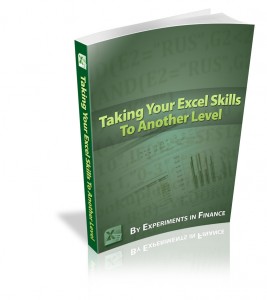CNNMoney recently featured an article headlined “Risk is back”. Was it ever gone?
In 2005, Allan Greenspan gave a speech in which he expressed concern that investors were becoming cavalier about accepting lower risk premiums and therefore paying for overpriced assets. (“Cavalier” is my paraphrasing. He’d never use a word so dramatic as that.) Greenspan continued, “History has not dealt kindly with the aftermath of protracted periods of low risk premiums.”
In finance, risk premium usually refers to the amount (%) over the risk-free rate that investors expect to gain for taking on an investment involving greater risk, such as stocks. The risk-free rate itself is a theoretical construct (nothing is actually entirely risk-free), but in practice, the interest rate on a short-term US Treasury bill is usually used. Both risk-premium and the risk-free rate come into play in the ubiquitous capital asset pricing model (CAPM), which describes the relationship between risk and returns.
Let’s see: the current rate on the 3-month T-bill is 4.8% (as of June 14, 2006). How much do you expect your investments in the stock market to return? Any ideas? How about examining historical returns? Here’s a lovely page from Stern that’s updated regularly showing historical returns on T-bills, stocks, and bonds.
But it turns out calculating risk premiums isn’t an easy task. Depending on the time period you choose, and taking different considerations into account (one of the most important being survivorship bias), you could argue that historical risk premiums in the US lie anywhere between 4%-8%. (Discussing and analyzing historical risk premiums is a very popular topic in finance. Tons of books and papers have been written on the topic, and a Google search of “historical risk premium” results in 10.8M hits!) At current 3-month T-bill rates, this means you should expect to make between 8.8%-12.8% in the market, long-term.
So, is the additional 4%-8% you might make investing in stocks worth their additional risk?
Thinking about this question, many things come into play here, including your level of risk aversion. The problem is that when it comes to stocks, for some reason, many people don’t think of it as real money being used to purchase and sell real assets. Maybe it’s because everything’s electronic now, and 401Ks and IRAs aren’t tangible objects. Or maybe many don’t understand the concept of a owning a company, how to read accounting statements, or what a stock really represents.
Stocks have also historically been used for hedging against inflation, but alternatives in the form of Treasury Inflation Protected Securities or TIPs are also available nowadays.
As you can tell by now, I don’t have an answer to the question I posed above, especially since I still consider myself very much a newcomer to true investing. Perhaps yet again the evidence just supports the boring but time-tested importance of diversifying among the various investment vehicles.
Any thoughts?
***************************************************
Look Good at Work and Become Indispensable Become an Excel Pro and Impress Your Boss

***************************************************


frank
“Was it ever gone”
My sentiment exactly. I’m glad I’m not the only one who thought the exact same thing when reading that headline.
Miserly Bastard
One problem with the “risk premium” concept that I have always considered is that our tax system creates distortions that reward certain assets, and punish others. For instance, the until relatively recently, the tax rate on dividend income was different from the rate on capital gains. There are distinctions between long and short term capital gains (the latter being taxed at ordinary income rates). Interest on bonds are taxed as ordinary income. These differential tax treatments distort the risk premium concept.
Ricemutt
Good points being raised as usual. Your comments remind me that I need to pay the same amount of attention to monitoring the tax implications of my transactions as conducting them.
tejee.in
Tax implications are very important. One of my friends was waiting for his pre-IPO stock options to mature and on the first go he went ahead and sold the first 25%. Only during the filing he realized that no only he is paying short term gains tax he has also gone in to a totally new tax bracket.
– tejee
Grabline - News and Deals - Grab it all here
I have been asking myself the same question for a long time now, and given the current volatility in the markets and high rates on CDs (some savings accounts now give 5% or more) mixed with rising rates on T-bills seems to point in the other direction, atleast for the time being.
Being diversified not only in stocks, but in investment vehicles too seems to be a good way of doing it.